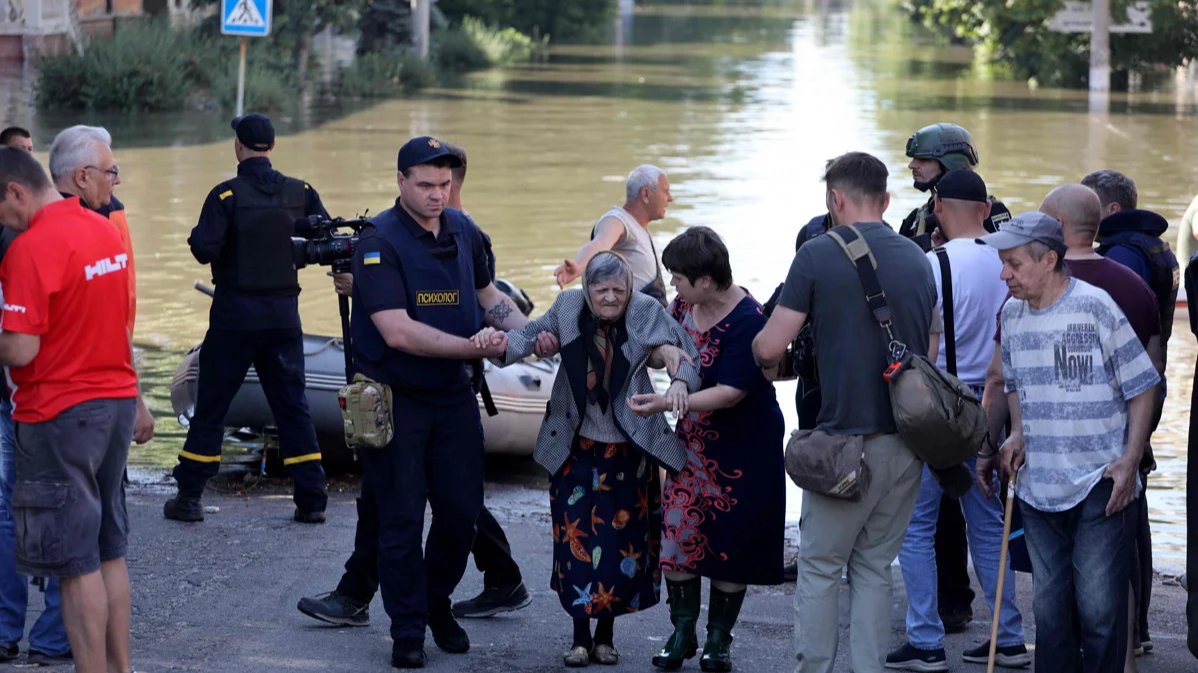The Kakhovka dam, built on the Dnipro River in southern Ukraine, collapsed in the early hours of 6 June 2023, leaving thousands of Kherson residents without homes and devastating the region’s natural life. While Kyiv has accused the Russians of a carrying out a “deliberate and premeditated crime” and vowing to bring Moscow to justice for destroying the dam, Russia maintains that it Ukraine blew up the dam, despite the havoc it unleashed on hundreds of square kilometres of Ukrainian-controlled territory.
One year on, the true scale of the destruction and the death toll are still unknown, as much of the flooded area remains under Russian occupation. Novaya Europe has reached out to local residents who have spoken to us in the past to hear their accounts of life since the flood.
‘I learnt how to tell how far off incoming fire was in my sleep’
Natalia, 40, unemployed, occupied Hola Prystan
Our once flourishing southern city has become a shadow of its former self. The city has no hospital, police, local authorities, or public transport. Everything is grey. There are now reeds and willows growing in the ruins of houses and what were once well-kept gardens. The willow is already two metres tall. There’s only one area that’s teeming with life, the one that was least affected by the floods, and there are very few people living in the rest of the city. Many houses have collapsed, either from the flood water or enemy fire.
I am not sure you can say this is a life we’re living, but we are trying to survive and adapt to the situation to preserve our sanity as best we can in these circumstances.
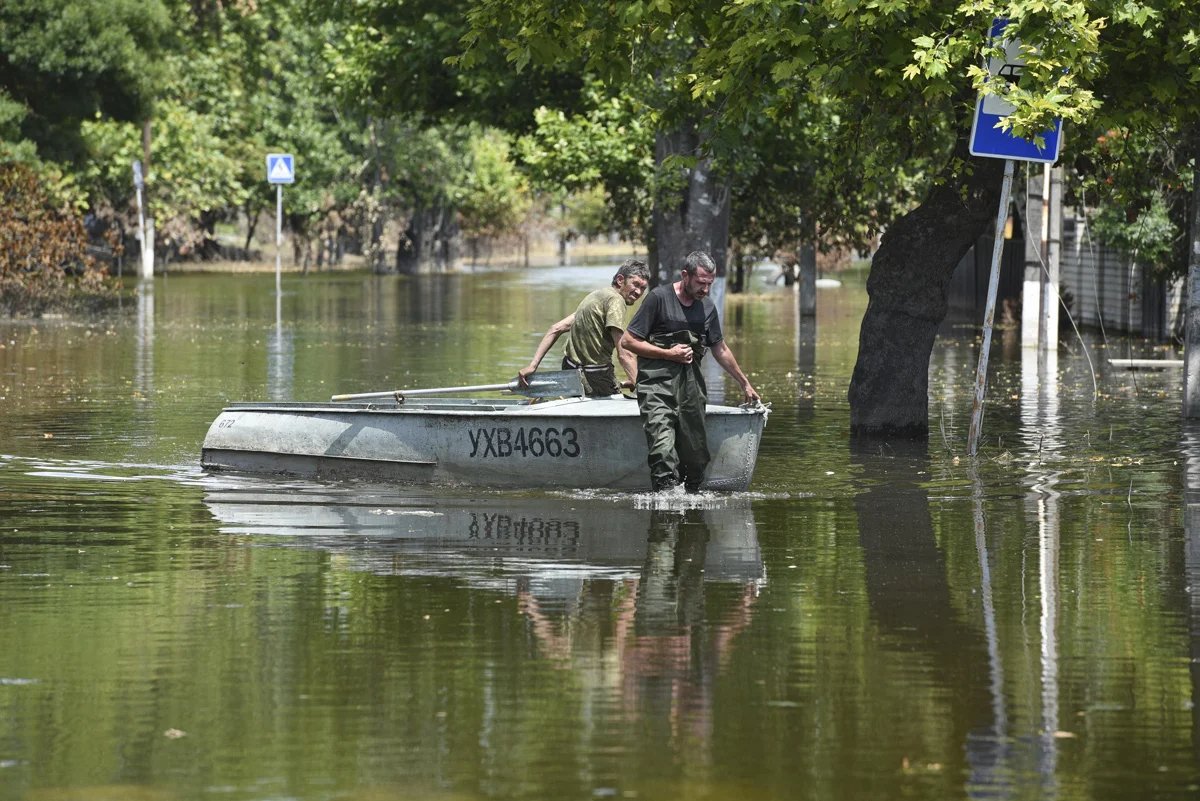
Evacuations from flooded areas of Hola Prystan in the Kherson region, Ukraine, 5 July 2023. Photo: Anadolu Agency / Abaca Press / ddp images / Vida Pres
I’m unemployed, like many of my friends and relatives who’ve chosen to stay. There are no jobs here. My husband, who’s in Ukrainian-controlled territory, and friends who’ve left for Europe help out. For now, you can still get cash out using a Ukrainian bank card.
Local children are now doing their third year of Ukrainian school online. But the internet is so bad that the most they can do is download their homework. I’m home-schooling my kids in all their subjects. We do the homework together and then we send it to their teachers.
When I’m not doing that, I work around the house, clean, do laundry, cook. And I work in the garden. That garden keeps us fed. I got some chickens, so now we have eggs and we’ll soon have meat.
I’m glad I was alone. I wouldn’t have managed with the children. My house was under water within a couple of hours, only part of the roof was left exposed.
By the evening, I’m so tired I can barely stand on my own two feet. I fall asleep quickly, but I wake up several times in the night when I hear explosions. I think I’ve even learnt how to determine how far off incoming fire is in my sleep. I don’t dream. Sometimes, when I start remembering the flood and wondering how I even survived, I’m unable to sleep.
I heard the dam had been blown up on the morning of 6 June. Shortly afterwards water began to flood the streets. At first, I just decided to put all the electrical appliances away. I took my children to stay with relatives just to be on the safe side, as they live on higher ground. Then I came home. By that evening, the water level was rising far more rapidly. I realised I had to leave and managed to climb through a window, after which I made my way by holding onto fences, trees and pillars. The flood water was loud and flowed with enough force to knock me off my feet.
I’m glad I was alone. I wouldn’t have managed with the children. My house was under water within a couple of hours, only part of the roof was left exposed.
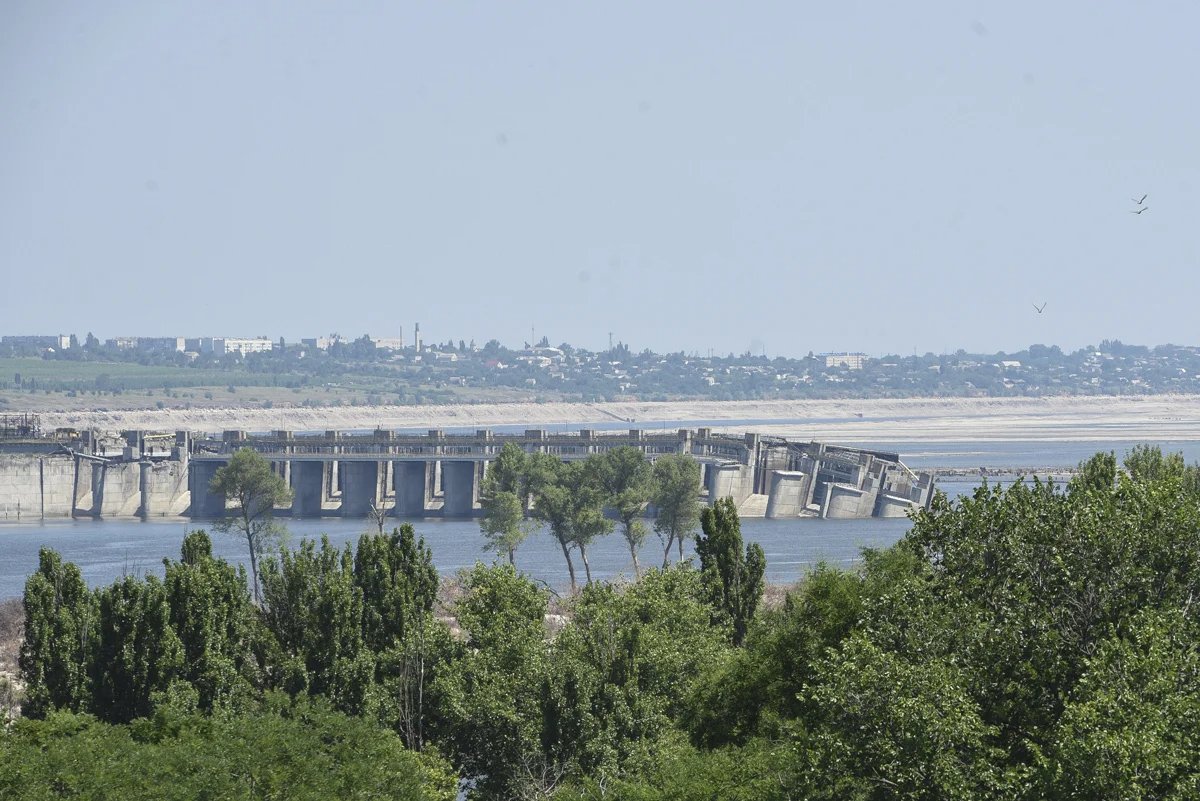
View of the destroyed Kakhovka dam on the banks of the Dnipro in the Kherson region, 5 July 2023. Photo: Anadolu Agency / Abaca Press / ddp images / Vida Press
Our relatives’ house, where I sat out the floods with the children, was only a metre deep in water. Eight of us took shelter there in total. We dragged all the necessary items — chairs, dishes, mattresses, blankets — up into the attic.
I can still clearly recall the terrifying sound of neighbouring houses buckling under the water. It sounded like bits of a broken Rubik’s Cube landing on the floor. Our house collapsed too and we had to move around for a while until a friend who had moved to Europe told us we could stay at her place.
The things I saw in the city then made my hair go grey. I didn’t even realise straight away. I saw myself in a mirror for the first time a few days later.
I can’t say the explosions have become less frequent. But the Russians now fire at us less, even when they’re drunk as they have to go easy on the shells and can’t afford to fire them for fun anymore.
In May, I had to apply for a Russian passport. I still can’t believe it. I feel such disgust.
We had to pool our money for petrol — thankfully our neighbour’s old Lada survived — to go to the passport office in Zaliznyi Port. What I saw there was a joke. It took me a week to calm back down. There was a crowd of people standing in the street in the scorching sun. A young woman with a baby was crying. There was a problem with her registration papers and she was stuck in that crowd for hours. One family from Kardashynka was there for the third time, but didn’t get seen again. They were literally begging them. They said they had spent all their money just to come, but in response, they were just told that wasn’t their problem.
The security guard would jump up brandishing his gun every now and again and shout at the crowd: “Move back 20 metres ago, otherwise I won’t let anyone in!” Meanwhile, the heat caused some waiting disabled people to faint.
I can’t imagine our Ukrainian passport officers yelling at people and waving guns around like that. The circumstances here are designed to humiliate people as much as possible. It was like being in a concentration camp.
‘I get water from the pump, I try to get food’
Andriy, 44, unemployed, occupied Oleshky
I got through the flood without any serious financial losses as I live on the upper floor of a five-storey building, so my furniture wasn’t ruined. The only problem is the mould climbing up the walls from the apartments on lower floors. But we try our best to tackle it. We dry out and air the other flats every now and again. Thankfully the owners left us their keys.
Shelling is the main problem now. Sometimes neighbouring houses get hit and those of us still here dash over to put out the fire, which isn’t easy as we’ve had no running water since 6 June last year. You have to go and get it yourself from the pump.
We haven’t been connected to the electricity grid since last year either. Now we’re reliant on the sun and have adapted to solar panels. I use them to charge my phone and can generate enough electricity for a lamp in my room. I could get a generator, but you always need petrol and oil for it, and I don’t have the money for all that. But I prefer to stay away from generators as much as possible: the Russian military owns about 80% of them in the town. They’re noisy and conspicuous, so attract attacks.
If you have money, you’ll find a way. If you don’t, then too bad. And the cycle never ends. It only stops when there’s heavy shelling and when I’m asleep, although I sleep very badly.
Thankfully, we have gas, so we can still cook. Those are the sole benefits of civilisation we enjoy. The fridge and washing machine don’t work. In winter, you can keep food on the balcony, but now we don’t keep anything we don’t eat immediately. We wash our clothes and bedding by hand.
The only pharmacy is at the hospital. Shops are closing. The owners are moving to Crimea or further afield. And I understand why. I’d leave myself and take my elderly parents with me if I could, but I can’t afford it. The border checks are frightening too: the FSB can take a dislike to anything, and then you’ll end up in some video about a “foiled terrorist attack”.
This whole year has been reduced to solving endless day-to-day problems: I get water from the pump every day, boil it up to drink and cook with, heat it to do the laundry, use solar panels, charge my phone, look for a mobile network, try to get food. If you have money, you’ll find a way. If you don’t, then too bad. And the cycle never ends. It only stops when there’s heavy shelling and when I’m asleep, although I sleep very badly. There are drones buzzing all night, weapons being fired. It’s quieter during the day, but I can’t sleep then as I have to take advantage of the daylight and fetch water.
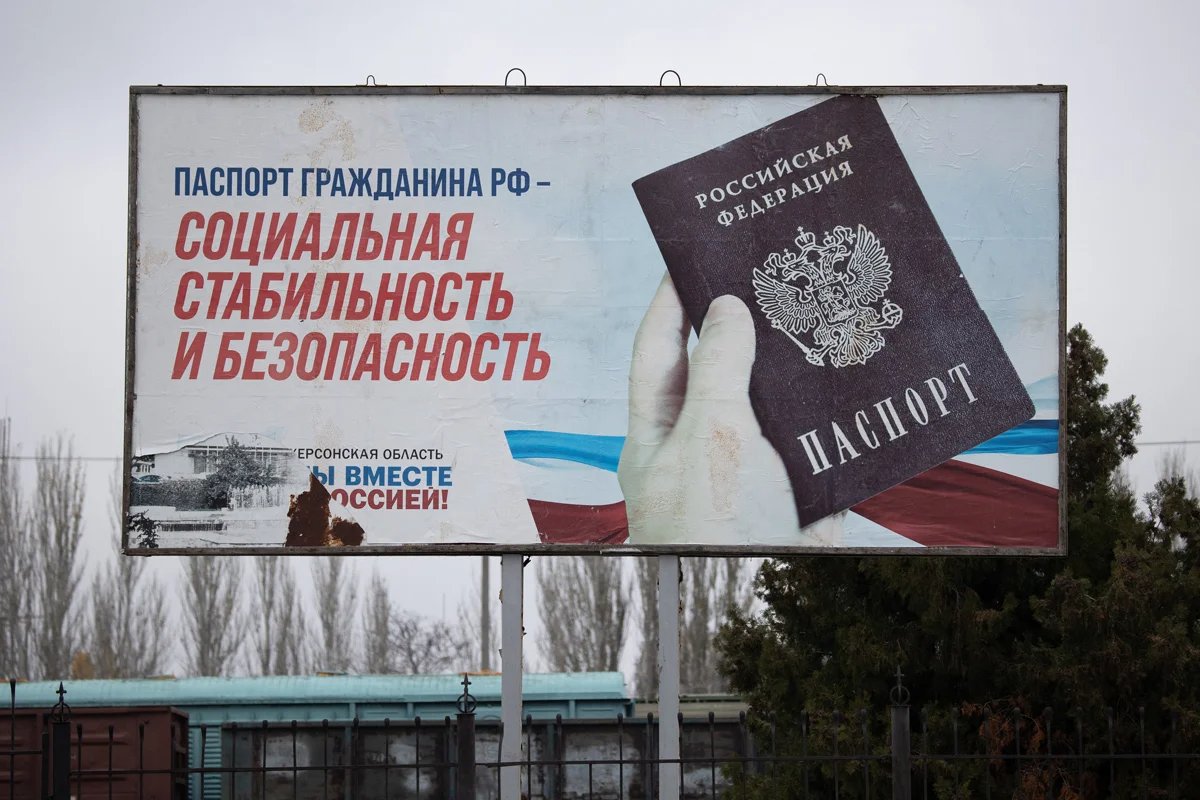
A Russian propaganda poster urges residents to apply for a Russian passport, Kherson, 13 November 2022. Photo: Raphaël Lafargue / Abaca / Sipa USA / Vida Press
‘I believe Russia will win, of course, but what if something goes wrong?’
Iryna, 53 years old, unemployed, occupied Hola Prystan — occupied Skadovsk
After the flood in Hola Prystan, we rented an apartment in Skadovsk, but now the Russians are saying more often that they’ll confiscate the housing left by Ukrainians and hand it over to the state. We’ve been told they’re going to house some specialists in this apartment and we have to leave.
We plan to move to Dzhankoi, in Crimea. We’ve bought an apartment there. Skadovsk is getting more dangerous by the day.
I was offered a job with the local authorities in Skadovsk but I turned it down. I believe Russia will win, of course, but what if something goes wrong? I want to live at home, but if I agree to work for the new administration, I’ll automatically be listed as a collaborator, and that would result in a criminal prosecution if Ukraine ever retook the area.
My child sometimes has the anti-aircraft siren go off at school and then they all run to the bomb shelter and sit there until they get the all-clear and then they go back to their desks.
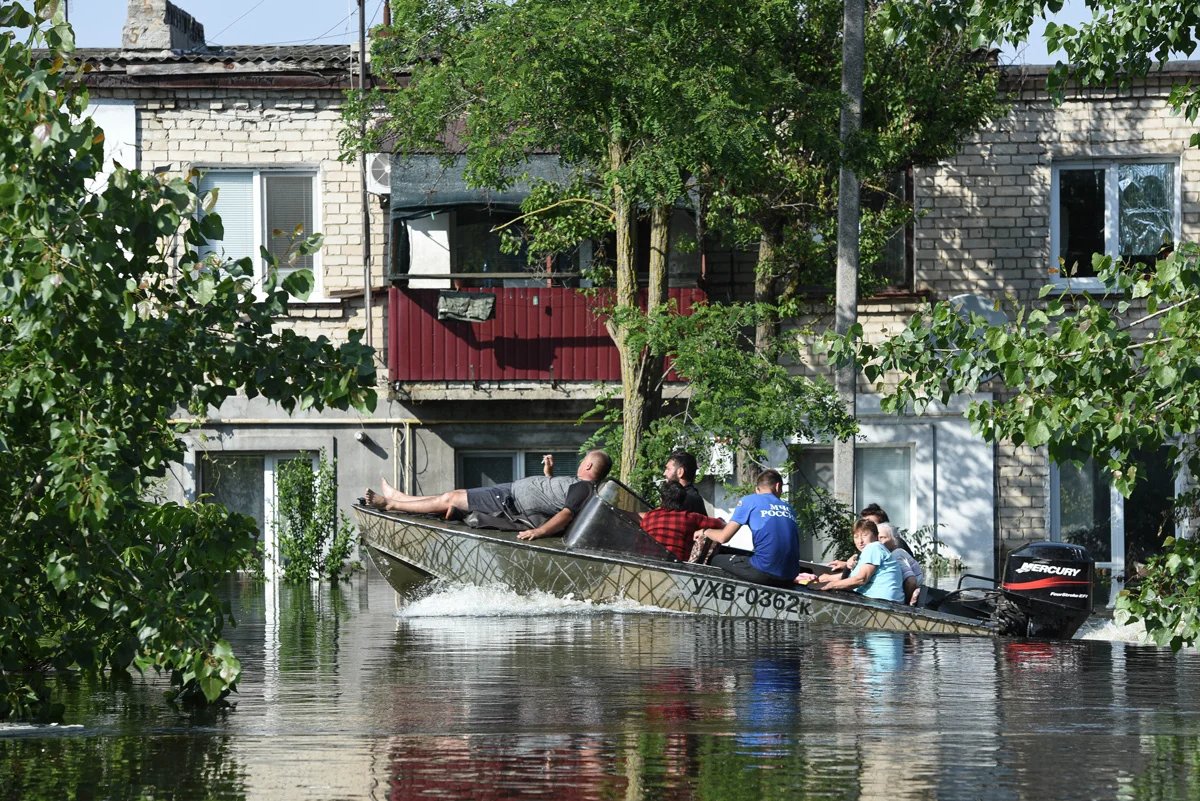
Residents evacuate from flooded areas of Hola Prystan, 8 June 2023. Photo: Anadolu Agency / Abaca Press / ddp images / Vida Press
On the whole, life in Skadovsk isn’t dangerous. You can count the number of large-scale attacks here in the last two years on the fingers of one hand. It’s not like in Hola Prystan or Kherson. We go for walks, eat in cafés looking out over the sea. A lot of people come here for a break.
I can see things being put in order here. Roads are being built. I don’t know what to think about future prospects.
I’m waiting for the war to end. We’re part of Russia now. Anyone who doesn’t like that has gone to Ukrainian-controlled areas. How long can we be shelled, drowned and shelled again?
A shop opened in our part of Hola Prystan, but it hasn’t been open for most of the war. The bakeries make bread and cakes but there’s nobody on the streets. I don’t know how to explain it.
I went to the cemetery in May: almost all my relatives are buried in Hola Prystan. People walked between the graves in single file, so as not to move off the path. It was dangerous. There could have been mines.
I’m waiting for the war to end. We’re part of Russia now. Anyone who doesn’t like that has gone to Ukrainian-controlled areas. How long can we be shelled, drowned and shelled again? Has Kyiv decided to wage war until the last Ukrainian is left standing? I don’t know what to expect.
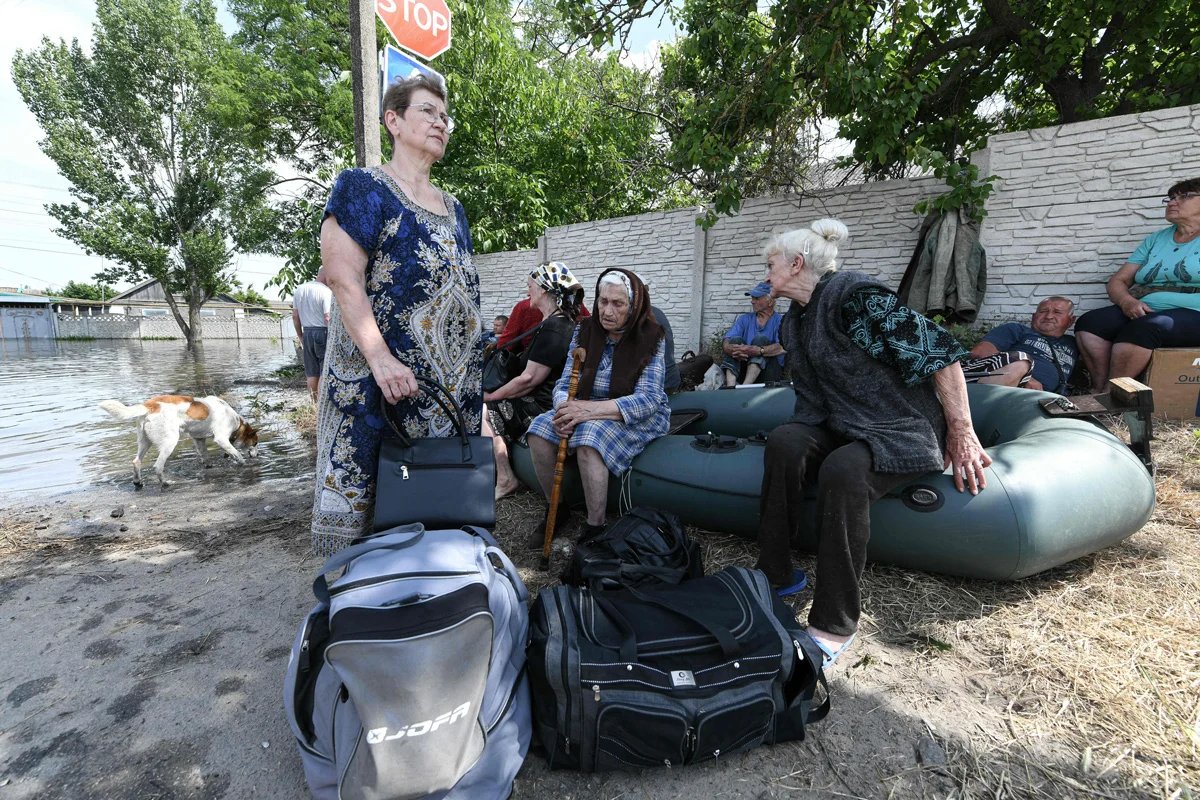
Elderly people await evacuation from flooded areas of Hola Prystan, 8 June 2023. Photo: Anadolu Agency / Abaca Press / ddp images / Vida Press
‘This war has wiped me out. I’m just going through the motions’
Oleksandr, 45, formerly self-employed, Ukrainian-controlled Kherson — Ukrainian-controlled Zakarpattia
My house in Kherson was completely destroyed. First, it was flooded up to the roof, then it was hit in another air strike. All that’s left is a pile of rubble. The small factory that had been feeding my family and the families of my staff for many years burned down when it was hit by a high-explosive incendiary device. We had nothing left, so my wife, my child and I collected what we could and set off in search of a new life.
I’d join the army today, but I have a dilapidated house it will be hard to survive the winter in. My mother-in-law is disabled, my wife has complex health issues and my child is at school.
Now we live in Zakarpattia. With the money we had left from our prosperous pre-war life, we bought a small old house in a remote village. We couldn’t afford anything else. The nature here is beautiful and the climate is nice, but the work situation is very bad. I’m trying to renovate the house over the summer. The roof is leaking and there’s no heating. I work all day at home, and in the evenings I work as a taxi-driver, as otherwise I won’t be able to feed my family. But to be honest, I’m running out of strength and patience.
You can’t get a job without military ID. Many businesses aren’t working at full capacity because they don’t have enough people. To get a job, you first need to go to the military enlistment office and get a certificate saying you can’t serve in the army. But if they decide that you can, then you probably won’t get out of there.
I’d join the army today, but I have a dilapidated house it will be hard to survive the winter in. My mother-in-law is disabled, my wife has complex health issues and my child is at school.
I can’t just up and leave them. We have no money at all and they wouldn’t be able to feed themselves. I justify it by doing my bit for the front from home.
My friends in the military have asked me to help them with electronics, and I’m good at making various complex items. I make pieces of kit for them, and friends send money so I can purchase the materials I need. At least I can help our fighters that way.
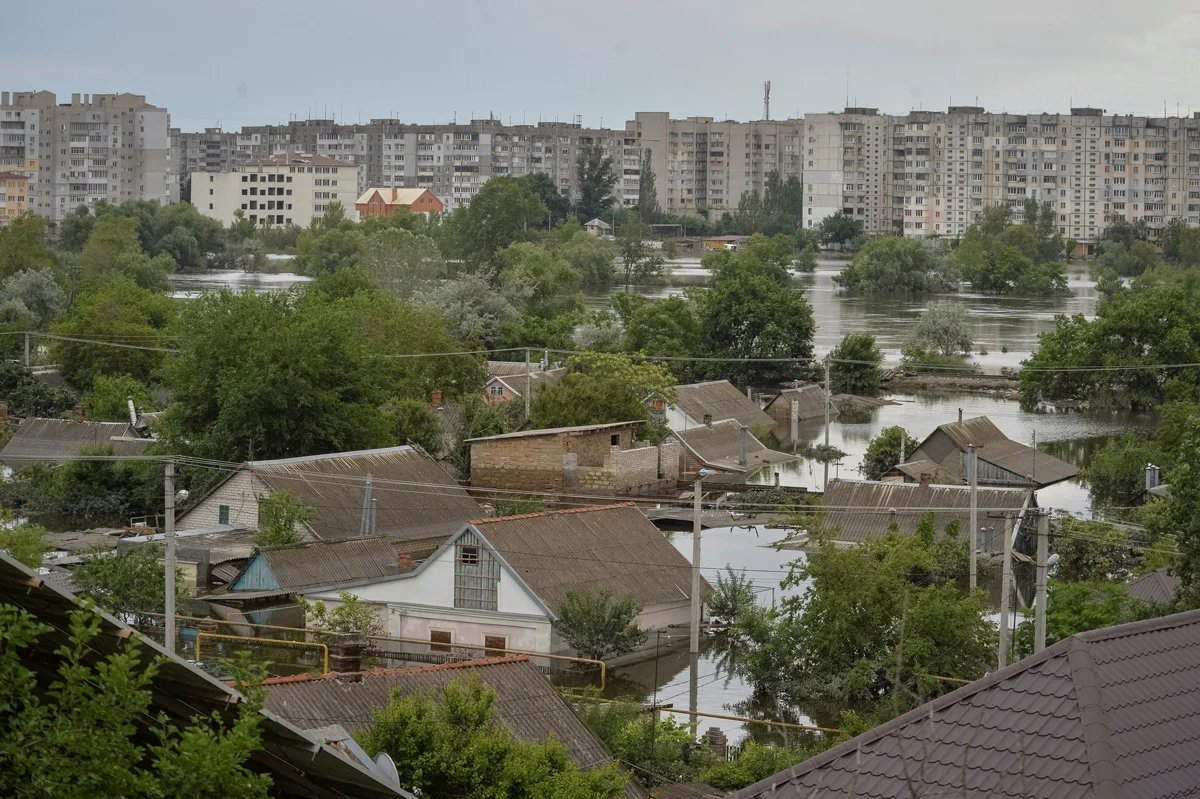
Flooded homes in Kherson, 10 June 2023. Photo: Oleksandr Klymenko / Reuters / Scanpix / LETA
I’m in a constant state of limbo. I don’t know what will happen tomorrow. I realise I won’t go back to Kherson. There are only three houses in our tiny village. I can speak to the neighbours, but our child has nobody to speak to. There are no other children nearby. He’s been studying online since the start of the war and this is basically his third year sitting at home.
This war has wiped me out. I’m just going through the motions, with no long-term plan. I’m sure things will get worse both in Ukraine and in Russia. We don’t hear the true numbers of dead and wounded. And there’s propaganda all around you. In both countries, theft is rampant at all levels of government.
At the same time, I understand that if I went to fight and got killed, my wife would face obstruction and months of bureaucracy to receive the compensation owed to her. Friends of ours whose husbands were killed are busy doing that now. The state withholds payments in any way they can, saying there’s no money left in the budget. Injured soldiers are often denied their payouts as well.
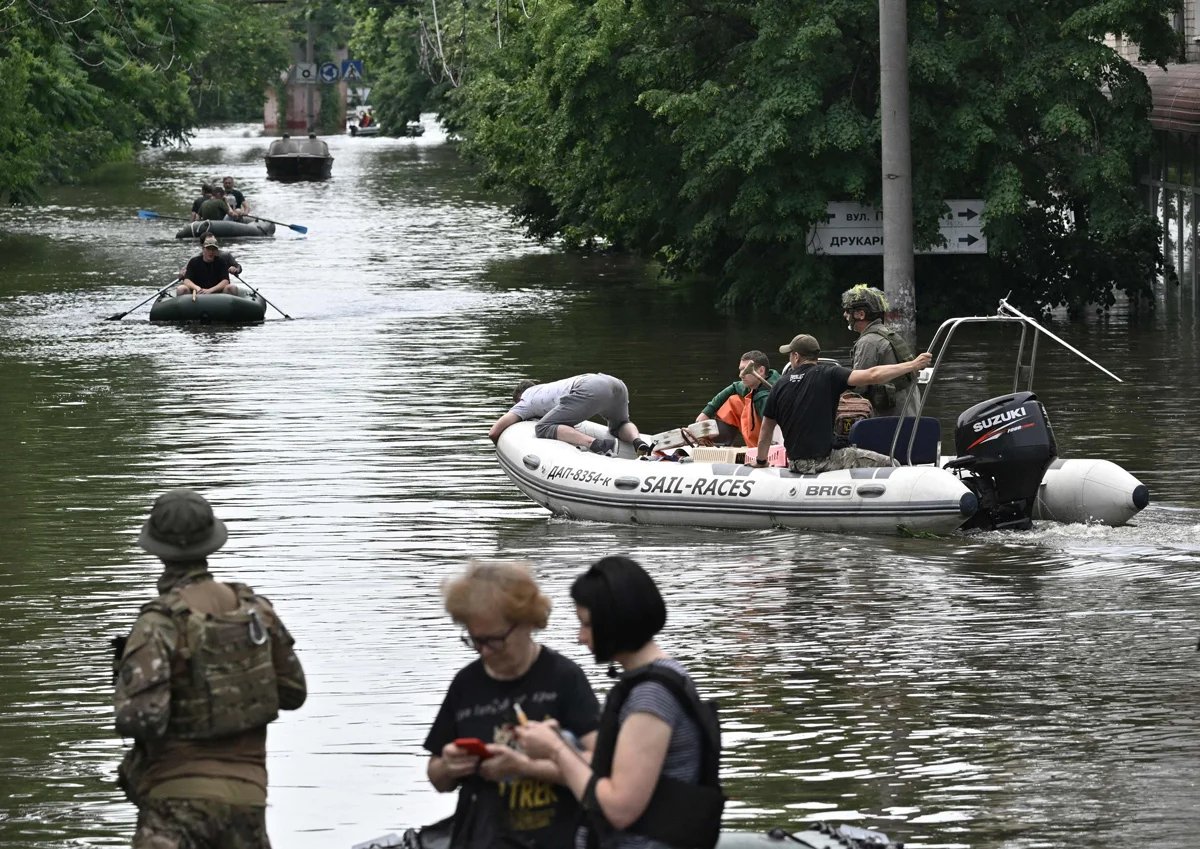
Ukrainian servicemen and volunteers sail boats during the evacuation from the flooded areas of Kherson, 8 June 2023. Photo: Genya Savilov / AFP / Scanpix / LETA
The division of society into rich and poor has become very pronounced. You walk down the street and you see some people hanging out in restaurants and driving beautiful cars. And next to them there’s someone rummaging through a bin.
War is a tragedy for everyone. I understand it could go on for many more years. My older daughters have gone to Europe and they’ll never come back. There’s no future here.
